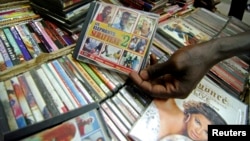YAOUNDE —
The government of Cameroon said international trade in counterfeit and pirated products cost the west African country $2 billion this year. This total does not include domestically produced and consumed counterfeit and pirated products and the significant volume of pirated digital products being distributed via the Internet. It says the items counterfeiters and pirates produce and distribute are dangerous, posing health and safety risks.
It is business as usual at the Ekounou Market, known for the sale of counterfeit and pirated goods in the heart of Cameroon's capital, Yaounde.
From toothpaste to industrial products, drugs, drinks and textiles, everything looks fake.
Yvette Tomo, a middle-aged merchant, tells VOA that it is not only at their market where counterfeited goods are bought and sold in broad daylight. “In Cameroon, you have an impression that practically every thing is fake," she noted. "If people also counterfeit medicines and baby milk then the situation is very bad.”
Some buyers in the market are aware that the goods they buy are likely counterfeit. One man says shoes he purchased lasted only two days.
Christian Ngambi, another customer at a shop that supplies building materials, says he is not sure of the quality of the goods he buys. “Today even when you buy nails, you are not sure of them. It is catastrophic,” he said.
Many Cameroonians go for counterfeit looking goods because they are generally cheaper, according to housewife Maikem Petra. “It is because of poverty, so what do we do? We make do with what we have,” she said.
Cameroonian officials said international trade in counterfeit and pirated products cost the country $2 billion this year and the local industry suffers the most.
Nobert Eloundou, an employee of a brewery company in Yaounde, said they are victims too. “People refill empty bottles with fake products and we need to fight against it because it is a crime at all levels and if they are not punished, they keep being there because it is a crime you cannot fight overnight,” he stated.
The hardest hit are companies producing textiles. David Matunle, an employee of a Cameroon textile company, said most of the counterfeited fabric comes from neighboring Nigeria.
Pirated digital products are distributed by way of the Internet, according to government officials.
Dr. Nick Ngwanyam of the Cameroon medical council has been struggling to put a stop to some fraudulent medical practices he said are committed by Chinese swindlers.
“There have been some Chinese guys, they went around the whole country with a certain chair. They say the chair makes diagnosis, when you sit in the chair, you don’t have to say something and the Chinese man comes and says the chair has made this diagnosis and you have to take this and that medicine and then they swindle money from you," Ngwanyam said.
Cameroon's Minister of Mines, Industry and Technological Development, Emmanuel Bonde, says counterfeiting and piracy are long-standing problems that have been growing in scope and magnitude and should be addressed.
Cameroon has now organized its first ever national week for the fight against piracy, with the goal of educating the public as a first step in fighting counterfeiting.
It is business as usual at the Ekounou Market, known for the sale of counterfeit and pirated goods in the heart of Cameroon's capital, Yaounde.
From toothpaste to industrial products, drugs, drinks and textiles, everything looks fake.
Yvette Tomo, a middle-aged merchant, tells VOA that it is not only at their market where counterfeited goods are bought and sold in broad daylight. “In Cameroon, you have an impression that practically every thing is fake," she noted. "If people also counterfeit medicines and baby milk then the situation is very bad.”
Some buyers in the market are aware that the goods they buy are likely counterfeit. One man says shoes he purchased lasted only two days.
Christian Ngambi, another customer at a shop that supplies building materials, says he is not sure of the quality of the goods he buys. “Today even when you buy nails, you are not sure of them. It is catastrophic,” he said.
Many Cameroonians go for counterfeit looking goods because they are generally cheaper, according to housewife Maikem Petra. “It is because of poverty, so what do we do? We make do with what we have,” she said.
Cameroonian officials said international trade in counterfeit and pirated products cost the country $2 billion this year and the local industry suffers the most.
Nobert Eloundou, an employee of a brewery company in Yaounde, said they are victims too. “People refill empty bottles with fake products and we need to fight against it because it is a crime at all levels and if they are not punished, they keep being there because it is a crime you cannot fight overnight,” he stated.
The hardest hit are companies producing textiles. David Matunle, an employee of a Cameroon textile company, said most of the counterfeited fabric comes from neighboring Nigeria.
Pirated digital products are distributed by way of the Internet, according to government officials.
Dr. Nick Ngwanyam of the Cameroon medical council has been struggling to put a stop to some fraudulent medical practices he said are committed by Chinese swindlers.
“There have been some Chinese guys, they went around the whole country with a certain chair. They say the chair makes diagnosis, when you sit in the chair, you don’t have to say something and the Chinese man comes and says the chair has made this diagnosis and you have to take this and that medicine and then they swindle money from you," Ngwanyam said.
Cameroon's Minister of Mines, Industry and Technological Development, Emmanuel Bonde, says counterfeiting and piracy are long-standing problems that have been growing in scope and magnitude and should be addressed.
Cameroon has now organized its first ever national week for the fight against piracy, with the goal of educating the public as a first step in fighting counterfeiting.




